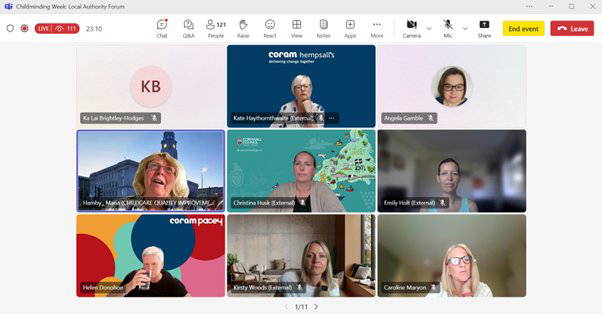Childminding: An endangered profession. The role of local authorities in rebuilding the childminding sector for children, families and the community.
During Childminding Week 2025, Coram PACEY and Childcare Works held a webinar for local authority representatives in England to discuss how they support recruitment and retention of the childminder workforce. The link between local authorities and childminders in the community is vital in supporting and stabilising childminder numbers.
We were joined by representatives from four local authorities: Barnsley, Cornwall, Cambridge and Norfolk to discuss what’s working in their area and what challenges remain, and an opportunity for the audience to ask questions.
We were delighted to welcome over 140 local authority representatives – making it our biggest ever local authority event focussing on childminders! We also welcomed some childminders to the session to hear the discussion. We hope the audience took away some ideas and insight into how they can support childminders in their area.
Recruiting new childminders
We spoke in depth about the methods local authorities have used to attract people into a career in childminder. Bespoke, one-to-one training programmes have been beneficial which accommodate flexibility for prospective childminders and are accessible, both online and in-person.
It’s clear having dedicated roles (such as Childminding Support Development Workers) are beneficial in guiding childminders through the registration and early stages, providing guidance and support.
“We felt that we were losing a lot of people along the ten-week journey or they that they couldn’t make a specific time. So we have now gone bespoke, and every single person that would like to be a childminder, we work with 1 to 1, and we work around what days and times best suit them.”- Barnsley local authority team
Start-up grants have made a tangible difference as an incentive, and whilst the government’s national start-up grant has now ended, some local authorities have continued to offer grants allocated funding (e.g. £600 grant in Norfolk). These support childminders with the initial setup and training costs.
“We run courses for newly registering childminders and there is a cost, and sometimes they struggle with it, particularly if they’re not working. We offer a payment plan if we can so they can pay it over several months, but to be able to know that they were having (the grant) come in as soon as they were registered, it certainly made a difference to them.” – Cambridge local authority team
Whilst digital outreach and marketing has proven very effective (e.g. via Facebook), other methods include advertising on public transport, personalised and bespoke responses to prospective childminders.
Support for existing childminders
Just as important as introducing new childminders into the sector is supporting the existing experienced professionals to stay in the sector. We discussed some of the key barriers that cause childminders to leave the profession, and how local authorities can support with this.
Paperwork and bureaucracy: Administrative burden, support with Ofsted inspections and regulation can be a major barrier for childminders. Local authorities can provide regular briefings to go through updates, peer support networks specifically targeting childminders, and guidance on new documentation and requirements.
Loneliness and morale: Particularly in rural areas, where childminders may work in isolation, local authority teams can create a sense of community through virtual networking and other events.
“There’s some really rural areas where you probably find you’ve got a maximum of two childminders in a community, and it’s really important that we bring them together even if it’s online… also doing our training and networking events – it’s so, so important to make sure they know they’re valued.” – Cambridge local authority team
Planning issues: Coram PACEY often hears from childminders who are experiencing planning permission constraints or disputes which can be costly and stressful. Local authority teams have a role to play in streamlining and supporting with these local issues.
“Where childminders are wanting to register a particular home, where they maybe have an assistant, we’re starting to see planning permission issues come up that are either costing a small fortune or they’re simply not granting the permission.” – Norfolk local authority team
Related children
Coram PACEY is a leading voice in the call for childminders to be able to claim funding for children related to them (non-parental). It was positive to hear support for this rule among local authority colleagues, given the impact it has on registered childminders, even driving some to leave the profession. This impact will be even more significant when the expansion to funding continues in September 2025. Read more about our campaign.
Other policy areas
Coram PACEY has been raising concerns about childminder integration into wider policy, such as the wraparound programme and free breakfast clubs. We know that childminder engagement in these programmes has been low, and many are worried about the business impact where resources can be geared toward school-based settings. Read more.
Local authorities have a role in coordinating with schools to ensure that childminders can fill gaps in demand for wraparound childcare, without harming existing services. Setting up strategic links between schools and early years settings, including childminders can be beneficial, particularly where schools cannot offer the flexible services that families require.
We also discussed the role of Family Hubs in the community, and the opportunity for childminders to link up with these to help raise awareness, collaborate and promote their services. There is a particular role for childminders in more rural areas to integrate with the wider community. However in some (often rural) areas, local authorities struggle to establish childminder engagement with Family Hubs. We also discussed the need for greater recognition among the public to elevate the status of childminders within the education sector. Local authority teams can promote childminding in communities, facilitating stay-and-play sessions, activities at libraries and recruitment events.
“We work closely with Family Hubs, they are set up in a way that is as inclusive as it possibly can be. I think for us it’s about empowering childminders to know that they have the right to speak to any professional.” – Norfolk local authority team
SEND support
We discussed the vital role of childminders for families of children with SEND due to their flexibility and home-based environment. Local authorities have a key role in supporting childminders through:
- Regular meetings with SEND updates
- Dedicated clinics and networking with local SENCOs for tailored and bespoke advice and planning
- Ensuring access to SEND inclusion grants and targeted resources.
“Childminders are absolutely pivotal when it comes to supporting children with SEND. We have people within Barnsley Inclusion Services who work with SENCO’s in nurseries but also work with childminders as individuals, to make sure that they’re accessing things like the inclusion grant.”- Barnsley local authority team
“Childminders can have meeting on Teams or over the phone, specifically with a SENCO for the area, at a time that suits them. They can talk about specific children, with parental consent, or they can have a general conversation – and that might then lead to a visit to the home as well to look at how we can support specific children. It’s working well.” – Cornwall local authority team
Coram PACEY’s work with local authorities
This webinar was just a small part of our wider project with local authorities in England.
- We’re encouraging local authorities in England to take our survey to tell us more about childminding in their area, what’s working and what support we can provide.
- We’re continuing to use our members’ feedback to monitor and support with issues at a local level
- We are supporting local authorities through our services and resources to promote childminding as a career option and as a choice of early education and childcare for families.
Thank you to our local authority speakers and the local authority colleagues and childminders who participated in our session. We hope you found it as inspiring and insightful as we did.



